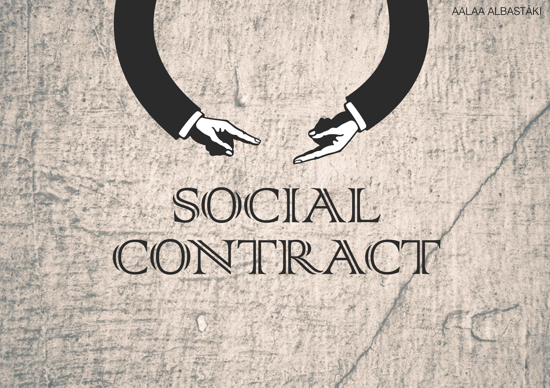Article in brief: The author looks into the recent demonstrations in Lebanon and explains the obligations of what governments and societies have towards one another, also known as the “Social Contract”.

“This protest is about a government that can no longer sustain the basic needs of its people.” Said one of the demonstrators protesting against the Lebanese government (Yan & Walsh, 2015). Due to various economic and political reasons, the Lebanese government was forced to shut down its Beirut landfills as part of its budget cuts. However, a few angry demonstrators ended up taking to the streets demanding a new government. What they fail to realize however is that it takes two to tango, and running a state requires both of the society and government to work together. There is a relationship between both parties where governments are obliged to provide the means of growth, and the people are obliged to use it wisely and efficiently.
Whenever you’re talking about the relation between people and government, Thomas Hobbes, John Locke, and Jean-Jacques Rousseau’s theory of the “social contract” is sure to follow. While all three have various differences in the theory, all agree that the relation between society and government is a contract (Rousseau, 1762). People choose or agree upon a government, and in return the government is expected to provide growth, security, and liberty to the people. On the other hand, the people themselves are expected to be patient with the government and utilize what was given to them efficiently and effectively to strengthen the state. In regards to Lebanon, the government was forced to shut down Beirut’s landfill, thus filling the streets with garbage. The impatient protestors are demanding a change of government for not fulfilling their obligation.
This of course leads to the heart of the issue, what is a government’s obligation? Just as providing resources is a duty for governments, utilizing the given resources is also a duty of the society. Take the United Arab Emirates as an example. The UAE provides a decent welfare to its citizens ranging from free education in all levels to an employment subsidy through Emiratization. The UAE has provided its local population with many incentives in order to promote social and economic growth. However, as oil reserves start to quench and oil prices start to plunder, the blessings they know of now may no longer be available in the near future (Reuters, 2015). Which means in order to maintain sustainability and growth, it is certain that various governmental subsidies will be cut back. As an example, in the UAE a wise step was taken in preparing society to start dining with a silver spoon rather than a gold one, from setting up road tollgates, to establishing corporate tax, the UAE is fulfilling parts of its obligation by gradually securing economic sustainability to its population (Gulf News, 2015).
The concept of gradual change and sustainability in shifting governmental agendas is not a new one. The renowned Irish politician of the 1750’s Edmund Burke calls this a “sustainable society”. In his book A Vindication of Natural Society, he believed that political and economic agendas should be developed gradually rather than abruptly (Bruke, 1756). Which is why Burke opposed the French Revolution and believed that change should take place naturally over time.
A government is obliged to provide its population with security and opportunities of economic and social growth. However, as I mentioned above, society too has an obligation it must adhere to. The role of society in this matter is to effectively utilize the benefits given to them by maximizing their potential. But when government starts to provide excessively, societies start to become pampered into an illusion that misguides them from realities. The famous German philosopher Arthur Schopenhauer stated that people take the limit of their own field of vision for the limits of the world. Meaning that when people live such lavish and carefree lifestyles they start to believe that everyone is living as such (Schopenhauer, 1844). Thus they will start to neglect those who are living in the outskirts of their communities, such as those with lower income. Society will then start to create its own luxurious bubble that refrains them from seeing beyond the lavish buildings and exuberant cars. This will divert society away from the core reason they were provided with such blessings in the first place, and that’s to become a productive society that stimulates economic and social growth.
The social contract is a theoretical, nonphysical contract between government and society. It is one whereby governments may remain in power with the consent of society so long as they fulfill their role and obligations towards society. For both governments and societies, there must be a balance between the givers and the receivers. If governmental obligations are not fulfilled, society will take to the streets demanding for change. However, if the government provides way more than its obligation, it starts to pamper citizens into an illusion whereby the productivity, efficiency, and growth of society deteriorates. Both governments and societies must look into a balanced contract whereby neither takes the other for granted and neither disrespects the other’s authority. As a society don’t take the blessings you have for granted and use them wisely.
References:
- Bruke, E. (1756). A vindication of natural society. London: Pr. for M. Cooper.
- Gulf News. (2015, July 2). UAE to finish drafting corporate tax, VAT laws this quarter. Retrieved Aug 24, 2015, from http://gulfnews.com/business/economy/uae-to-finish-drafting-corporate-tax-vat-laws-this-quarter-1.1544584
- Reuters. (2015, Aug 23). UAE stocks sink on oil’s slide, Saudi worries. Retrieved Aug 24, 2015, from http://www.reuters.com/article/2015/08/23/markets-stocks-gulf-idUSL5N10Y02Q20150823
- Rousseau, J.-J. 1.-1. (1762). The social contract. London: J. M. Dent & sons. ltd.; New York, E. P. Dutton & co.
- Schopenhauer, A. (1844). The world as will and representation.
- Yan, H., & Walsh, N. (2015, 8 24). Lebanon: How piles of trash led to a violent uprising against the government. Retrieved 8 25, 2015, from http://edition.cnn.com/2015/08/24/middleeast/lebanon-beirut-protests-explainer/



